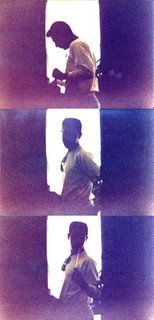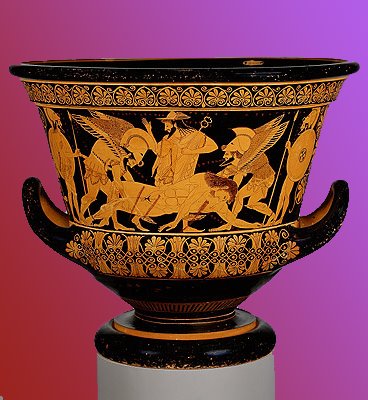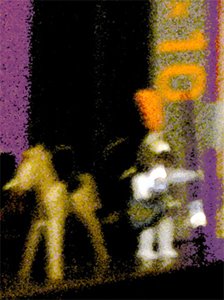
moderate grayish violet to moderate reddish purple
Sunday, July 30, 2006
Saturday, July 29, 2006
μ α ί α ν δ ρ ε ;
 συγνώμη, αλλά τα έχω πάρει τώρα...
συγνώμη, αλλά τα έχω πάρει τώρα...που είσαι παιδάκι μου;
με το που μπήκα εγώ, βγήκες εσύ;
κι άντε βγήκες, που έχεις πάει;
έχω πάρει σβάρνα τα monitors
και τα NEXT BLOG για να σε βρω.
δε λέω έχω γνωρίσει καταπληκτικούς/ές
bloggers με αυτό το searchομάνι,
αλλά εσένα δε σε βρίσκω.
θα αφήσω τούτο το post.
θα περιμένω comment σου εδώ.
θα διαβάσω τι θα μου γράψεις και "λίγο να παίξει το μάτι σου θα ξέρω..."
κι αν δεν απαντήσεις θα βγω σαν τον Δήμου με φέιγ βολάν να σε ψάχνω ως άλλον doncat.
gel yavrum, gel... (γλυκά ala Selcuk Munir)
cabuk gel, gibi (ala Selcuka turka προστακτικιά)
kardesim gelsin bekliyorum... (άντε και με υποκτακική μπρε)
Friday, July 28, 2006
hey :-)
don't go
ain't the world
just braces
aint't your dreams
dread places
hey :-)
smiles me
makes me-self
audacious
hey :-)
don't go
Sunday, July 23, 2006
Flatland - Fjaerland
 I call our world Flatland, not because we call it so,
I call our world Flatland, not because we call it so,In such a country, you will perceive at once that it is
On the contrary, we could see nothing of the kind,
Nothing was visible, nor could be visible, to us,
...
If our friend comes closer to us we see
FLATLAND
Friday, July 21, 2006
mauve Σαρπηδώνας
mauve αφιέρωση
 Αφιερωμένο στο φίλο μου Μαίανδρο, που με blogoπαράσυρε και που τον αγαπώ σα να ήταν ο μικρός μου αδερφός. (εννοώ να είμασταν αγαπημένα αδερφάκια, όχι σαν τον Θανάση που επιμελώς κανόνιζε τη δολοφονία του Παύλου, τρελαμένος από τη ζήλια επειδή βύζαινε το μωρό κι εκείνος κοτζάμ μαντράχαλος στα 4μισυ χρόνια του ήθελε να του λέει η μαμά του συνέχεια την ώρα, γιατί είχε το ρολόι στο χέρι που κράταγε το κεφάλι του μωρού και κάθε που κύτταγε για να του πει, έπεφτε το παιδί τ'ανάσκελα... καλά ήταν κι αστροπελέκι η Όλγα, η μάνα τους... χμμ άσχετο)
Αφιερωμένο στο φίλο μου Μαίανδρο, που με blogoπαράσυρε και που τον αγαπώ σα να ήταν ο μικρός μου αδερφός. (εννοώ να είμασταν αγαπημένα αδερφάκια, όχι σαν τον Θανάση που επιμελώς κανόνιζε τη δολοφονία του Παύλου, τρελαμένος από τη ζήλια επειδή βύζαινε το μωρό κι εκείνος κοτζάμ μαντράχαλος στα 4μισυ χρόνια του ήθελε να του λέει η μαμά του συνέχεια την ώρα, γιατί είχε το ρολόι στο χέρι που κράταγε το κεφάλι του μωρού και κάθε που κύτταγε για να του πει, έπεφτε το παιδί τ'ανάσκελα... καλά ήταν κι αστροπελέκι η Όλγα, η μάνα τους... χμμ άσχετο)Αφιερωμένο λοιπόν στον αυθόρμητο κι ακριβό μου φίλο, αυτό το λουλουδάκι και σε όλους εσάς εδώ μέσα που τον έχετε βάλει στην καρδιά σας και το link σας φυσικά...
Thursday, July 20, 2006
Tuesday, July 04, 2006
mauve sidharta
 In the shade of the house, in the sunshine of the riverbank near the boats, in the shade of the Sal-wood forest, in the shade of the fig tree is where Siddhartha grew up, the handsome son of the Brahman, the young falcon, together with his friend Govinda, son of a Brahman. The sun tanned his light shoulders by the banks of the river when bathing, performing the sacred ablutions, the sacred offerings. In the mango grove, shade poured into his black eyes, when playing as a boy, when his mother sang, when the sacred offerings were made, when his father, the scholar, taught him, when the wise men talked. For a long time, Siddhartha had been partaking in the discussions of the wise men, practising debate with Govinda, practising with Govinda the art of reflection, the service of meditation. He already knew how to speak the Om silently, the word of words, to speak it silently into himself while inhaling, to speak it silently out of himself while exhaling, with all the concentration of his soul, the forehead surrounded by the glow of the clear-thinking spirit. He already knew to feel Atman in the depths of his being, indestructible, one with the universe.
In the shade of the house, in the sunshine of the riverbank near the boats, in the shade of the Sal-wood forest, in the shade of the fig tree is where Siddhartha grew up, the handsome son of the Brahman, the young falcon, together with his friend Govinda, son of a Brahman. The sun tanned his light shoulders by the banks of the river when bathing, performing the sacred ablutions, the sacred offerings. In the mango grove, shade poured into his black eyes, when playing as a boy, when his mother sang, when the sacred offerings were made, when his father, the scholar, taught him, when the wise men talked. For a long time, Siddhartha had been partaking in the discussions of the wise men, practising debate with Govinda, practising with Govinda the art of reflection, the service of meditation. He already knew how to speak the Om silently, the word of words, to speak it silently into himself while inhaling, to speak it silently out of himself while exhaling, with all the concentration of his soul, the forehead surrounded by the glow of the clear-thinking spirit. He already knew to feel Atman in the depths of his being, indestructible, one with the universe.But he, Siddhartha, was no a source of joy for himself, he found no delight in himself. Walking the rosy paths of the fig tree garden, sitting in the bluish shade of the grove of contemplation, washing his limbs daily in the bath of repentance, sacrificing in the dim shade of the mango forest, his gestures of perfect decency, everyone's love and joy, he still lacked all joy in his heart. Dreams and restless thoughts came into his mind, flowing from the water of the river, sparkling from the stars of the night, melting from the beams of the sun, dreams came to him and a restlessness of the soul, fuming from the sacrifices, breathing forth from the verses of the Rig-Veda, being infused into him, drop by drop, from the teachings of the old Brahmans._SIDDHARTHA, an Indian Tale, by Hermann Hesse
Monday, July 03, 2006
oppland going north - n o r w a y

With each new generation a restless impulse stirs the hearts of
ξ ό ρ κ ι
Συ που θα πας
Σσσς, μη μιλάς
Συ που θα πας σε ξένη γη
Σαν έρθει η αυγή
Να θυμηθείς
Τι προσπαθείς
Να σταματήσω τη στιγμή
Μας προσπερνά, δεν ωφελεί
Αν φύγεις, φεύγει
Δεν μπορώ
Ο χρόνος φεύγει
Όχι εγώ
Ανέβα πάνω στο λεπτό
στον λεπτοδείχτη
Κράτα γερά
Οι δείχτες σπρώχνουν το λεπτό
είναι από σίδερο γερό
δεν τους βαστώ
Συ κράτα τούτη τη στιγμή
Του ρολογιού τον χτύπο
Και φκιάξε επίμονο ρυθμό
που να 'χει μέσα τον καιρό
Και τον χαμό
Χρέος πικρό
Πού είσαι, πες μου
Εδώ μακριά σου
Έφυγε κι όλας η στιγμή
οριστικά
Και γίναν όλα διαφορετικά
Και η σιωπή
Που ακολουθά
Μας παρασέρνει, μας μεθά
Και μας βυθίζει στην αρχή
Του χρόνου πριν να γεννηθεί
Μνήμη πιστή
Πάει να σβηστεί
(Ένα ρολόι στο καπηλειό - Μάνος Χατζιδάκις)
Blog Archive
-
▼
2006
(44)
-
▼
July
(17)
- μ ω β___σ ε λ ί δ α___2
- μ ω β___σ ε λ ί δ α___1
- μ α ί α ν δ ρ ε ;
- hey :-)
- mauve knight
- "like a large, light-gray rock"
- Flatland - Fjaerland
- mauve Σαρπηδώνας
- mauve αφιέρωση
- ε υ χ ή
- m a u v e g h o s t
- ...εγκλωβισμένος μια 20η Ιουλίου...
- mauve sidharta
- oppland going north - n o r w a y
- No title
- ξ ό ρ κ ι
- ο καρώ πρίγκιπας με το flat top στο τρένο
-
▼
July
(17)
Mauves
- ΜauveΑΙΑΝΔΡΟΣ
- alexandros-mauvelover
- love is porn and permanently MAUVE
- 2ShotsofHappy1ShotofSad= MAUVEcoctail
- nonprivatelife-mauved
- mauveAKOS
- MAUVEGATOS
- MAUVEstripper
- 10 με mauve=11
- ροδιά ουρλιάζει μωβ
- μούτρα=simplyμωβ
- μούτραnew=πάλιmauve
- Y.K.Mauve T.
- mauvegaylolita
- mauve BOY
- Bonnie&Mauve
- La Condition Mauveine
- αμβρόσιος μωβ
- angelidakis_MAUVIVER
- mauveres diastaseis
- Pascal Mωβς‚
- Mauve_Sheep
- Mauve_Angel
- OneMauve/day-ALEXANDROS
- MauveDELTA
- Sandouri Mauve Bey
Neues Mauves
Architecture
- Shigeru Ban
- steven HOLL
- ateliersJEANNOUVEL
- Eisenman
- BIG
- Coop Himmelblau
- Delugan Meissl
- Foster & Partners
- Fuksas
- Franken
- Future Systems
- Greg Lynn
- Group A
- MAD
- Mansilla & Tuñon
- Manuelle Gautrand
- Mazaki Endoh
- Meyer en Van Shooten
- Morphosis
- MVRDV
- Neil M Denari
- New Territories
- NOMAD
- NOX
- OMA
- ONL
- Propeller Z
- ReD
- Rene van Zuuk
- Reiser Umemoto
- Saunders
- Sauerbruch Hutton
- UN Studio
- Doxiadis
- TEAM 10
- Vito Acconci
- West 8
- Werne Aisslinger
- X-ref
- Zaha Hadid
- Renzo Piano
- Richard Rogers







